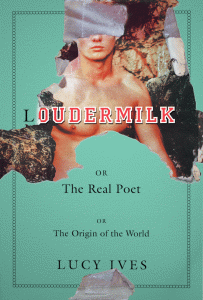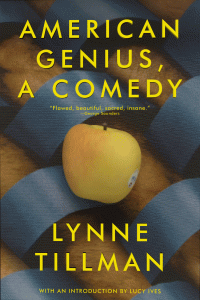Lucy Ives
Lucy Ives is the author of the novels Impossible Views of the World and Loudermilk: Or, The Real Poet; Or, The Origin of the World, as well as the editor of The Saddest Thing Is That I Have Had to Use Words: A Madeline Gins Reader. Ives's writing has appeared in Art in America, Artforum, The Believer, frieze, Granta, and Vogue, among other publications. She received a 2018 Creative Capital/Andy Warhol Foundation Arts Writers Grant.
Subscribe to our newsletter for news & events from Soft Skull Press.
Books
Loudermilk
Or, The Real Poet; Or, The Origin of the World
This New York Times Book Review Editors' Choice, is "hilarious . . . a riotous success. Equal parts campus novel, buddy comedy and meditation on art-making under late capitalism, the novel is a hugely funny portrait of an egomaniac and his nebbish best friend" (The Washington Post).It’s the end of summer 2003. George W. Bush has recently declared the mission in Iraq accomplished, the unemployment rate is at its highest in years, and Martha Stewart has just been indicted for insider trading. Meanwhile, somewhere in the Midwest, Troy Augustus Loudermilk (fair-haired, statuesque, charismatic) and his companion Harry Rego (definitely none of those things) step out of a silver Land Cruiser and onto the campus of The Seminars, America’s most prestigious creative writing program, to which Loudermilk has recently been accepted for his excellence in poetry.
Loudermilk, however, has never written a poem in his life.
Wickedly entertaining, beguiling, layered, and sly, Loudermilk is a social novel for our time: a comedy of errors that deftly examines class, gender, and inheritance, and subverts our pieties about literature, authorship, art making, and the institutions that sustain them.
American Genius, A Comedy
Grand and minute, elegiac and hilarious, Lynne Tillman expands the possibilities of the American novel in this dazzling read about a former historian ruminating on her own life and the lives of others--named a best book of the century by Vulture.In the hypnotic, masterful American Genius, A Comedy, a former historian spending time in a residential home, mental institute, artist’s colony, or sanitarium, is spinning tales of her life and ruminating on her many and varied preoccupations: chair design, textiles, pet deaths, family trauma, a lost brother, the Manson family, the Zulu alphabet, loneliness, memory, and sensitive skin--and what “sensitivity” means in our culture and society.
Showing what might happen if Jane Austen were writing in 21st-century America, Tillman fashions a microcosm of American democracy: a scholarly colony functioning like Melville's Pequod. All this is folded into the narrator's memories and emotional life, culminating in a seance that may offer escape and transcendence--or perhaps nothing at all. This new edition of a contemporary classic features an introduction by novelist Lucy Ives.
Catapult | Counterpoint | Soft Skull
1140 Broadway #706
New York, NY 10001
646.926.0805 | contact@softskull.com
1140 Broadway #706
New York, NY 10001
646.926.0805 | contact@softskull.com






